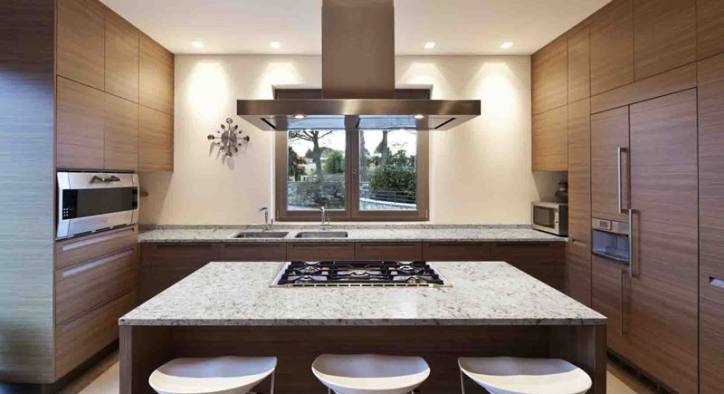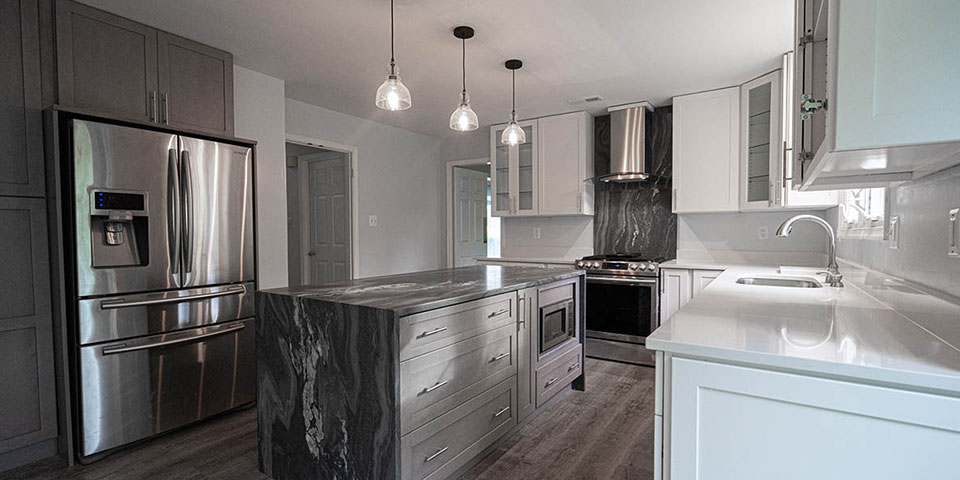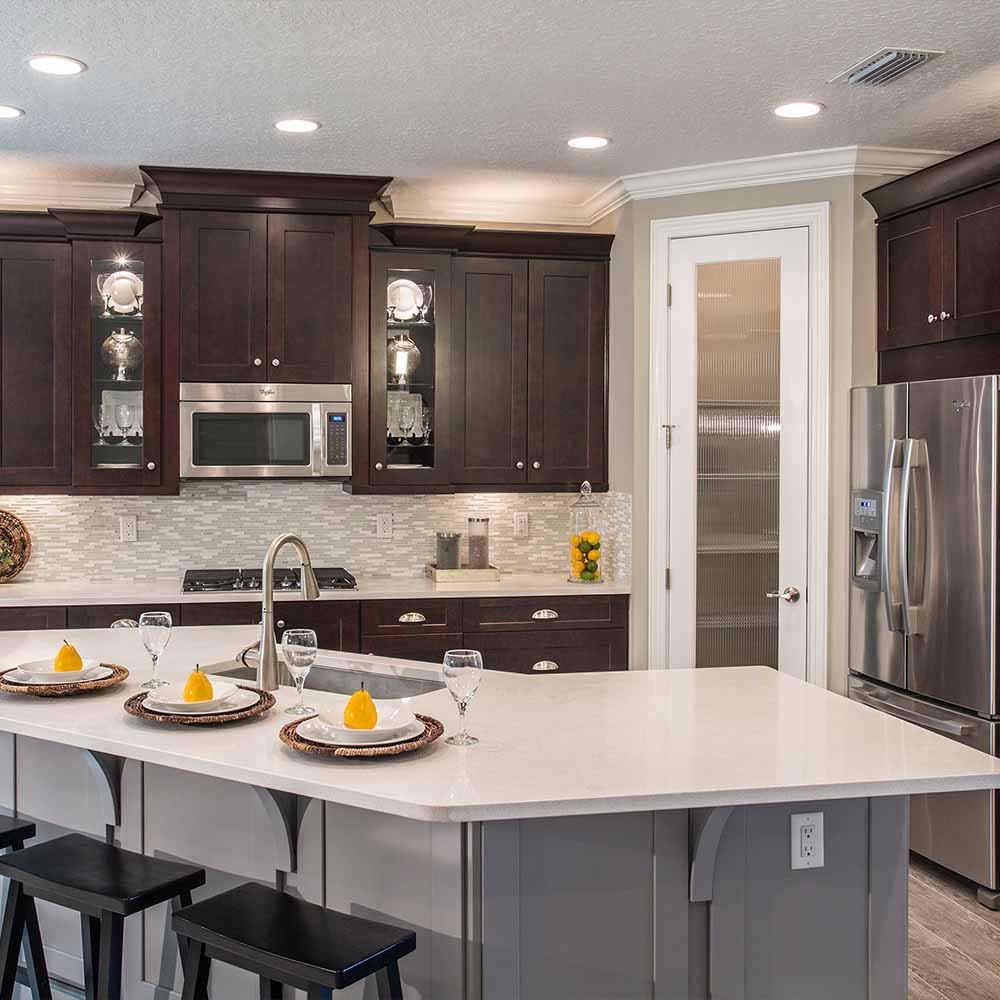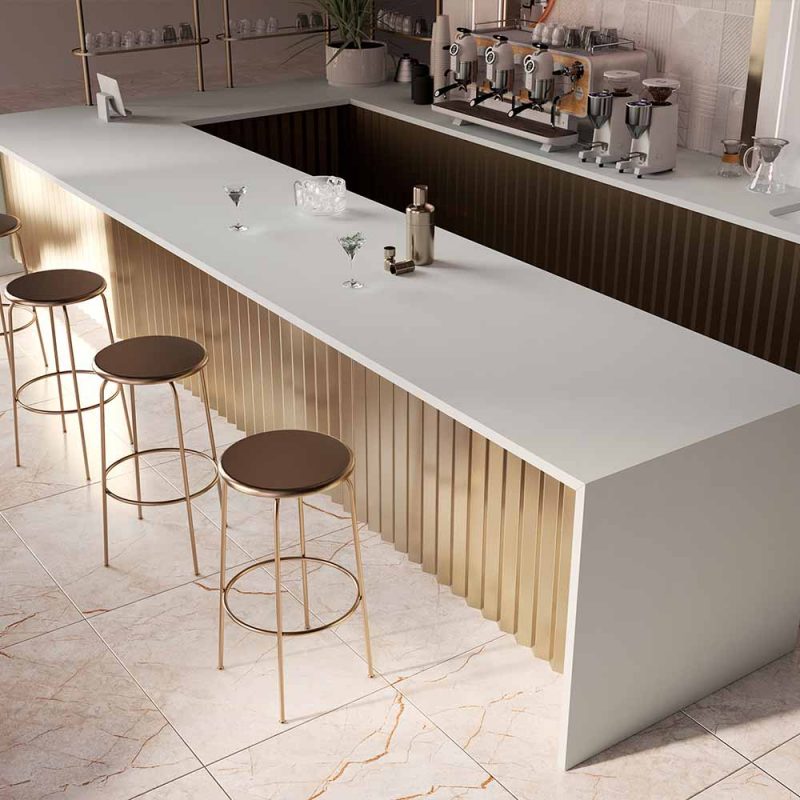Introduction
Choosing the perfect kitchen countertop can be a daunting task, as it plays a crucial role in both the functionality and aesthetics of your kitchen. With so many options available in the market, it’s essential to understand the factors to consider when making this significant decision. In this ultimate guide, we will explore the various types of kitchen countertops, their pros and cons, and provide tips on how to choose the right countertop for your kitchen.
Importance of Kitchen Countertops
Kitchen countertops are an essential part of any kitchen, serving as a workspace for meal preparation, a gathering spot for family and friends, and a focal point for the overall kitchen design. The right countertop can enhance the functionality and appearance of your kitchen, while the wrong choice can result in inconvenience and costly mistakes.

This interest may you Transform Your Kitchen with Stunning Countertop Designs
Factors to Consider When Choosing Kitchen Countertops
Before diving into the different types of countertops, it’s crucial to understand the factors to consider when making your decision. Here are some key considerations to keep in mind:
Types of Kitchen Countertops
There are various types of kitchen countertops available in the market, each with its unique characteristics, pros, and cons. Let’s explore some of the most popular options:
-
Granite Countertops
- Granite is a natural stone that is known for its durability, heat resistance, and timeless beauty. It’s available in a wide range of colors and patterns, making it a versatile choice for any kitchen design. However, granite countertops require regular sealing and can be costly.
-
Quartz Countertops
- Quartz countertops are engineered stone countertops made from quartz crystals mixed with resin and pigments. They are known for their durability, low maintenance, and resistance to stains and scratches. Quartz countertops are available in a wide range of colors and patterns, making them a popular choice for modern kitchens.
-
Marble Countertops
- Marble is a natural stone that is known for its elegance and luxury. It’s available in various colors and patterns and can add a timeless and classic look to any kitchen. However, marble is porous and can be susceptible to staining, chipping, and scratching, requiring high maintenance.
-
Solid Surface Countertops
- Solid surface countertops are made from acrylic or polyester materials and are known for their seamless appearance and low maintenance. They are available in various colors and patterns and can mimic the look of natural stone at a lower cost. However, solid surface countertops are not heat resistant and can be prone to scratches.

Pros and Cons of Each Type of Countertop (cont.)
Granite
- Durable and heat resistant
- Wide range of colors and patterns available
- Adds a natural and timeless look to the kitchen
Cons:
- Requires regular sealing
- Can be costly
Quartz
- Highly durable and resistant to stains and scratches
- Low maintenance
- Wide range of colors and patterns available
- Non-porous, making it hygienic for food preparation
Cons:
- Can be relatively expensive
Marble
- Elegant and luxurious appearance
- Natural beauty and unique veining patterns
- Adds a classic and timeless look to the kitchen
Cons:
- Porous and prone to staining, chipping, and scratching
- High maintenance and requires regular sealing
Solid Surface
- Seamless appearance with no visible seams or joints
- Low maintenance and easy to clean
- Affordable option that can mimic the look of natural stone
Cons:
- Not heat resistant and can be prone to scratches
- Limited in color and design options compared to other materials
Popular Kitchen Countertop Materials
- In addition to the types mentioned above, there are other popular kitchen countertop materials to consider, such as:
-
Laminate Countertops
- Laminate countertops are made of layers of paper or fabric soaked in resin and bonded to a particleboard core. They are known for their affordability, easy maintenance, and wide range of color and pattern options. However, laminate countertops can be less durable and prone to damage from heat and moisture.
-
Concrete Countertops
- Concrete countertops offer a modern and industrial look to the kitchen. They are highly customizable in terms of shape, color, and texture. However, concrete countertops require proper sealing and can be susceptible to cracking and staining if not maintained properly.
-
Wood Countertops
- Wood countertops add warmth and natural beauty to the kitchen. They are known for their unique character, durability, and ability to be sanded and refinished. However, wood countertops require regular sealing and can be prone to staining and scratching.
-
Tile Countertops
- Tile countertops are made of ceramic or porcelain tiles arranged on a substrate. They are affordable, easy to clean, and offer a wide range of design options. However, tile countertops can be prone to chipping, cracking, and grout staining.
How to Choose the Right Countertop for Your Kitchen
- Selecting the perfect kitchen countertop requires careful consideration of various factors. Here are some tips to help you make the right choice:
- Budget Considerations: Determine your budget and look for countertop materials that fit within your budget. Keep in mind that the cost of countertops includes not only the material but also installation and maintenance expenses.
- Durability and Maintenance: Consider the durability and maintenance requirements of different countertop materials. Some materials may require regular sealing, while others may be more resistant to stains, scratches, and heat. Think about how much time and effort you are willing to invest in maintenance.
- Design and Style: Think about the overall design and style of your kitchen when selecting a countertop material. Consider the color, pattern, and texture options available with each material and how it will complement your kitchen’s aesthetic.
- Functionality: Consider how you use your kitchen countertop and choose a material that fits your needs. For example, if you do a lot of cooking and food preparation, you may need a heat-resistant and durable material like granite or quartz.
- Personal Preferences: Consider your personal preferences and lifestyle when choosing a countertop material. If you value natural beauty and uniqueness, you may opt for marble or wood countertops. If you prefer a modern and sleek look, solid surface or concrete countertops may be a better fit.

- Conclusion Choosing the perfect kitchen countertop involves careful consideration of various factors such as durability, maintenance, cost, design, functionality, and personal preferences. Granite, quartz, marble, and solid surface are popular options with their own pros and cons, while laminate, concrete, wood, and tile countertops offer unique characteristics. By taking into account your budget, lifestyle, and kitchen design, you can make an informed decision that suits your needs and preferences.
- “The Ultimate Guide to Selecting the Perfect Kitchen Countertop: Factors to Consider for Your Dream Kitchen” This title emphasizes the comprehensive nature of the article, positioning it as the ultimate guide for readers who are looking to select the perfect kitchen countertop. It highlights the importance of considering various factors in order to make an informed decision for creating their dream kitchen.
- “Choosing the Right Kitchen Countertop: A Comprehensive Guide for Your Home Renovation” This title focuses on the concept of choosing the right kitchen countertop, positioning the article as a comprehensive guide that covers all the essential information needed for readers who are planning a home renovation. It conveys the idea that the article will provide detailed insights and guidance for making the right choice.
- “Mastering the Art of Choosing the Perfect Kitchen Countertop: A Step-by-Step Guide for Homeowners” This title presents the selection process of choosing a kitchen countertop as an art that can be mastered, positioning the article as a step-by-step guide for homeowners. It conveys the idea that the article will provide expert guidance and actionable steps for readers to follow in order to make an informed decision and select the perfect countertop for their kitchen.Frequently Asked Questions (FAQs)
- Can I use granite countertops in my outdoor kitchen? Yes, granite is a durable and heat-resistant material that can be used in outdoor kitchens. However, proper sealing and maintenance are required to protect it from weather elements.
- Are quartz countertops safe for food preparation? Yes, quartz countertops are non-porous and do not harbor bacteria, making them hygienic for food preparation.
- Can I cut directly on marble countertops? No, marble is a soft and porous material that can be prone to scratching and staining. It is recommended to use cutting boards or mats to protect marble countertops.
- Can I install laminate countertops myself? Yes, laminate countertops are relatively easy to install and can be a DIY project. However, professional installation may be recommended for a more precise and durable result.
- Can I refinish wood countertops? Yes, wood countertops can be sanded and refinished to restore their original beauty. Regular sealing and maintenance can also extend their lifespan.
- Budget Considerations: Determine your budget and look for countertop materials that fit within your budget. Keep in mind that the cost of countertops includes not only the material but also installation and maintenance expenses.
-


Pingback: Top 10 Trendy Countertop Ideas for Your Dream Kitchen | Fairfax Marble